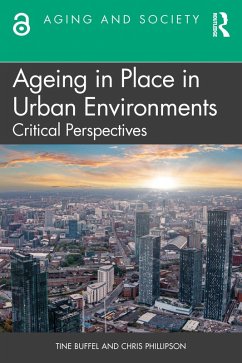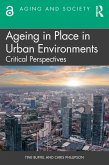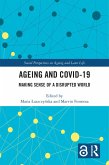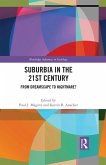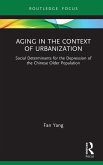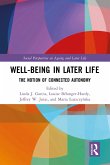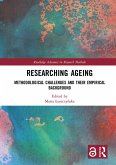Tine Buffel, Chris Phillipson
Ageing in Place in Urban Environments (eBook, PDF)
Critical Perspectives
0,00 €
0,00 €
inkl. MwSt.
Sofort per Download lieferbar

0 °P sammeln
0,00 €
Als Download kaufen

0,00 €
inkl. MwSt.
Sofort per Download lieferbar

0 °P sammeln
Jetzt verschenken
Alle Infos zum eBook verschenken
0,00 €
inkl. MwSt.
Sofort per Download lieferbar
Alle Infos zum eBook verschenken

0 °P sammeln
Tine Buffel, Chris Phillipson
Ageing in Place in Urban Environments (eBook, PDF)
Critical Perspectives
- Format: PDF
- Merkliste
- Auf die Merkliste
- Bewerten Bewerten
- Teilen
- Produkt teilen
- Produkterinnerung
- Produkterinnerung

Bitte loggen Sie sich zunächst in Ihr Kundenkonto ein oder registrieren Sie sich bei
bücher.de, um das eBook-Abo tolino select nutzen zu können.
Hier können Sie sich einloggen
Hier können Sie sich einloggen
Sie sind bereits eingeloggt. Klicken Sie auf 2. tolino select Abo, um fortzufahren.

Bitte loggen Sie sich zunächst in Ihr Kundenkonto ein oder registrieren Sie sich bei bücher.de, um das eBook-Abo tolino select nutzen zu können.
Ageing in Place in Urban Environments considers together two major trends influencing economic and social life: population ageing on the one side and urbanisation on the other.
- Geräte: PC
- ohne Kopierschutz
- eBook Hilfe
- Größe: 5.44MB
Andere Kunden interessierten sich auch für
![Ageing in Place in Urban Environments (eBook, ePUB) Ageing in Place in Urban Environments (eBook, ePUB)]() Tine BuffelAgeing in Place in Urban Environments (eBook, ePUB)0,00 €
Tine BuffelAgeing in Place in Urban Environments (eBook, ePUB)0,00 €![Ageing and COVID-19 (eBook, PDF) Ageing and COVID-19 (eBook, PDF)]() Ageing and COVID-19 (eBook, PDF)0,00 €
Ageing and COVID-19 (eBook, PDF)0,00 €![Suburbia in the 21st Century (eBook, PDF) Suburbia in the 21st Century (eBook, PDF)]() Suburbia in the 21st Century (eBook, PDF)44,95 €
Suburbia in the 21st Century (eBook, PDF)44,95 €![Aging in the Context of Urbanization (eBook, PDF) Aging in the Context of Urbanization (eBook, PDF)]() Fan YangAging in the Context of Urbanization (eBook, PDF)21,95 €
Fan YangAging in the Context of Urbanization (eBook, PDF)21,95 €![Well-being In Later Life (eBook, PDF) Well-being In Later Life (eBook, PDF)]() Well-being In Later Life (eBook, PDF)42,95 €
Well-being In Later Life (eBook, PDF)42,95 €![Bushwick's Bohemia (eBook, PDF) Bushwick's Bohemia (eBook, PDF)]() Mario HernandezBushwick's Bohemia (eBook, PDF)42,95 €
Mario HernandezBushwick's Bohemia (eBook, PDF)42,95 €![Researching Ageing (eBook, PDF) Researching Ageing (eBook, PDF)]() Researching Ageing (eBook, PDF)0,00 €
Researching Ageing (eBook, PDF)0,00 €-
-
-
Ageing in Place in Urban Environments considers together two major trends influencing economic and social life: population ageing on the one side and urbanisation on the other.
Dieser Download kann aus rechtlichen Gründen nur mit Rechnungsadresse in A, B, BG, CY, CZ, D, DK, EW, E, FIN, F, GR, HR, H, IRL, I, LT, L, LR, M, NL, PL, P, R, S, SLO, SK ausgeliefert werden.
Produktdetails
- Produktdetails
- Verlag: Taylor & Francis eBooks
- Seitenzahl: 218
- Erscheinungstermin: 13. Juli 2023
- Englisch
- ISBN-13: 9781000932478
- Artikelnr.: 68369349
- Verlag: Taylor & Francis eBooks
- Seitenzahl: 218
- Erscheinungstermin: 13. Juli 2023
- Englisch
- ISBN-13: 9781000932478
- Artikelnr.: 68369349
- Herstellerkennzeichnung Die Herstellerinformationen sind derzeit nicht verfügbar.
Tine Buffel is Professor of Sociology and Social Gerontology at the University of Manchester, UK, where she leads the Manchester Urban Ageing Research Group. Her research primarily focuses on issues of inequality, ageing in place, and underlying processes of spatial and social exclusion in later life. Much of her work has involved co-production methodologies, building on partnerships with older people, local authorities, and community organisations to study and address equity and justice issues in urban environments. She has published widely in the field of ageing and age-friendly cities, contributing a critical lens to the study of urban ageing and assisting the development of policies to improve the experience of ageing in cities.
Chris Phillipson is Professor of Sociology and Social Gerontology in the School of Social Sciences at the University of Manchester, UK. He has led a number of research programmes in the field of ageing concerned with family and community life in old age, problems of poverty and social exclusion, social theory and ageing, and issues relating to urbanisation and migration. His theoretical work has focused on developing a critical gerontology which explores and challenges some of the dominant social and cultural assumptions made about ageing and ageing societies. He has published a number of books in the field of ageing and a variety of papers on age-friendly issues.
Chris Phillipson is Professor of Sociology and Social Gerontology in the School of Social Sciences at the University of Manchester, UK. He has led a number of research programmes in the field of ageing concerned with family and community life in old age, problems of poverty and social exclusion, social theory and ageing, and issues relating to urbanisation and migration. His theoretical work has focused on developing a critical gerontology which explores and challenges some of the dominant social and cultural assumptions made about ageing and ageing societies. He has published a number of books in the field of ageing and a variety of papers on age-friendly issues.
Part 1: Critical perspectives on ageing in place in urban environments:
Background, theory and development 1. Introduction: Ageing in place in
urban environments 2. Population ageing and urbanisation: Developing
age-friendly cities 3. Urbanisation, inequality and community: Experiences
of ageing in place 4. Ageing in neighbourhoods undergoing urban change:
Experiences of gentrification in later life 5. Experience of ageing in
place among ageing migrants living in urban neighbourhoods 6. Growing older
in 'extreme cities': The impact of climate change Part 2: Re-building urban
communities for ageing populations 7. The role of social infrastructure as
centres of community life in supporting ageing in place in cities 8.
Enacting 'agency' through place-making and activism: Older people as local
agents of urban change 9. Towards a collaborative urbanism: Building
collective organisations for later life 10. Ageing populations and urban
communities: An agenda for change
Background, theory and development 1. Introduction: Ageing in place in
urban environments 2. Population ageing and urbanisation: Developing
age-friendly cities 3. Urbanisation, inequality and community: Experiences
of ageing in place 4. Ageing in neighbourhoods undergoing urban change:
Experiences of gentrification in later life 5. Experience of ageing in
place among ageing migrants living in urban neighbourhoods 6. Growing older
in 'extreme cities': The impact of climate change Part 2: Re-building urban
communities for ageing populations 7. The role of social infrastructure as
centres of community life in supporting ageing in place in cities 8.
Enacting 'agency' through place-making and activism: Older people as local
agents of urban change 9. Towards a collaborative urbanism: Building
collective organisations for later life 10. Ageing populations and urban
communities: An agenda for change
Part 1: Critical perspectives on ageing in place in urban environments:
Background, theory and development 1. Introduction: Ageing in place in
urban environments 2. Population ageing and urbanisation: Developing
age-friendly cities 3. Urbanisation, inequality and community: Experiences
of ageing in place 4. Ageing in neighbourhoods undergoing urban change:
Experiences of gentrification in later life 5. Experience of ageing in
place among ageing migrants living in urban neighbourhoods 6. Growing older
in 'extreme cities': The impact of climate change Part 2: Re-building urban
communities for ageing populations 7. The role of social infrastructure as
centres of community life in supporting ageing in place in cities 8.
Enacting 'agency' through place-making and activism: Older people as local
agents of urban change 9. Towards a collaborative urbanism: Building
collective organisations for later life 10. Ageing populations and urban
communities: An agenda for change
Background, theory and development 1. Introduction: Ageing in place in
urban environments 2. Population ageing and urbanisation: Developing
age-friendly cities 3. Urbanisation, inequality and community: Experiences
of ageing in place 4. Ageing in neighbourhoods undergoing urban change:
Experiences of gentrification in later life 5. Experience of ageing in
place among ageing migrants living in urban neighbourhoods 6. Growing older
in 'extreme cities': The impact of climate change Part 2: Re-building urban
communities for ageing populations 7. The role of social infrastructure as
centres of community life in supporting ageing in place in cities 8.
Enacting 'agency' through place-making and activism: Older people as local
agents of urban change 9. Towards a collaborative urbanism: Building
collective organisations for later life 10. Ageing populations and urban
communities: An agenda for change
